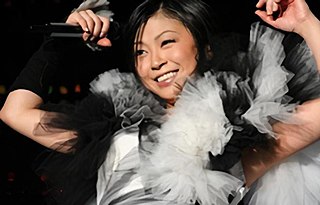
Hikaru Utada, also known mononymously as Utada, is a Japanese-American singer, songwriter and producer. Utada is considered to be one of the most influential, bestselling musical artists in Japan.

Deep River is the fourth studio album by Japanese-American singer Hikaru Utada. It was released via Toshiba EMI on June 19, 2002. The title of the album, as well as its title track, was inspired by the novel Deep River by Shusaku Endo. Utada wrote and co-produced the majority of the record, and unlike her previous album Distance (2001), she worked primarily with Japanese collaborator Akira Miyake and her father Teruzane Utada. Musically, Deep River is widely noted by fans and critics as the transition state from Utada's earlier style, R&B, to ethereal pop.

"Passion" is a song recorded by Japanese-American singer-songwriter Hikaru Utada, taken as the fourth single from her studio album Ultra Blue (2006). It premiered on December 14, 2005, in two physical formats and for digital consumption, distributed by EMI Japan and EastWorld. "Passion", alongside its English counterpart "Sanctuary", were used as the national and international theme songs to the Square Enix video game Kingdom Hearts II (2005); the tracks serve as the successors to "Hikari" and its English counterpart, "Simple and Clean", which are found on Kingdom Hearts.

"Hikari" is a song recorded by Japanese–American recording artist Hikaru Utada for her fourth studio and third Japanese language album, Deep River (2002). It premiered on March 20, 2002, as the third single from the album in Japan. It was written and composed by Utada, whilst production and arrangement was handled by Utada, her father Teruzane Utada, and long-time collaborator Miyake Akira. The single, and a remix by Russell McNamara, was used as the official Japanese theme song for the 2002 action role-playing video game Kingdom Hearts, and appeared on its original soundtrack respectively. Musically, "Hikari" is a pop folk song. Lyrically, it is about mysteries in life and human activities.
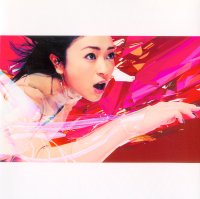
"Traveling" is a song recorded by Japanese–American recording artist Hikaru Utada. It was released as the second single from her fourth studio and third Japanese language album, Deep River (2002). The track was written and composed by Utada, whilst production was handled by Utada, her father Teruzane Utada, and long-time collaborator Akira Miyake. Musically, "Traveling" is a dance-pop song, influenced by house music. Lyrically, it discusses human activities and dreams.

"Addicted to You" is a song by Japanese-American recording artist Hikaru Utada from her second studio album Distance (2001). It was released as the album's lead single on November 10, 1999 by EMI Music Japan. "Addicted to You" was written by Utada and produced by Jimmy Jam & Terry Lewis; this is Utada's first collaboration with American producers and composers. The single artwork was shot by American photographer Richard Avedon and features two black-and-white figures of Utada. Musically, "Addicted to You" is an R&B song.

"First Love" is a song by the Japanese-American singer-songwriter Hikaru Utada. It was released on April 28, 1999, as the third Japanese language single from her second studio album, First Love, which was issued a month previously. It was certified double platinum for 800,000 copies shipped to stores in Japan.
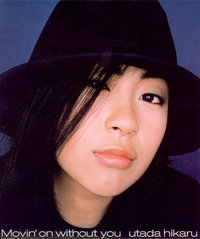
"Movin' On Without You" is the second single by Japanese–American singer and producer Hikaru Utada. It serves as the second single from her debut studio album First Love (1999). The song was the first song that Utada had written and composed by herself. "Movin' On Without You" was incepted while Utada was attending high school in Tokyo, Japan, during 1997. Utada, who received a recording contract by Toshiba-EMI, had written an English-language version of the song, which remains unreleased to this day.
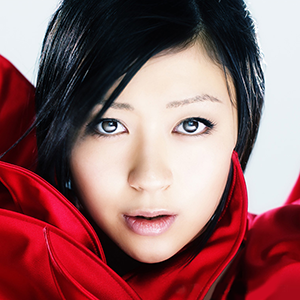
Ultra Blue is the sixth album by Japanese–American singer Hikaru Utada, released on June 14, 2006, by EMI Music Japan. It is the first original Japanese language album under Hikaru Utada's name in four years since her third album Deep River (2002). Ultra Blue contains thirteen songs, including six singles released between 2003 and 2006. While the arrangements for her album Deep River were done collaboratively, all but one of the songs on Ultra Blue were written, composed, and arranged solely by Utada, who also did the programming herself. In this album, the R&B elements that have been present since her debut are further diminished, and the majority of the songs have an electronic flavor with an emphasis on synth sounds.
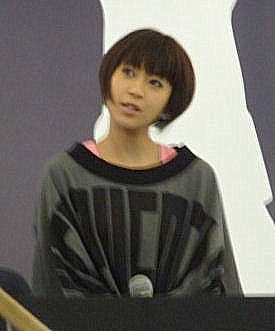
The discography of Japanese-American R&B and pop singer Hikaru Utada consists of eleven studio albums, four compilation albums, eleven video albums and numerous singles and promotional singles. Utada began as a musician in the early 1990s as a member of U3, a family unit made up of her, her mother Junko Utada, also known as 1970s enka singer Keiko Fuji, and her father, musical producer Teruzane Utada. U3 released their debut album Star in 1993, with the hope to debut in America. In 1996, the group was rebranded as Cubic U, an R&B project focusing on Hikaru Utada, resulting in the English language album Precious in 1998 with record label Toshiba EMI.

"Kiss & Cry" is a song recorded by Japanese American recording artist Hikaru Utada for their seventh studio and fifth Japanese album, Heart Station (2007). It was written, composed, and arranged by Utada, whilst production was handled by Utada, their father Teruzane Utada, and Akira Miyake. The single premiered on May 31, 2007 as the third single from the album in Japan. It was re-released as a double A-side single with "Beautiful World", which also appeared on the parent album on August 29 in Japan, and digitally worldwide. Musically, "Kiss & Cry" is an R&B song, influenced by pop and hip-hop music. Lyrically, it discusses both Utada's upbringing and social beliefs between both Western and oriental regions.

Heart Station is the seventh studio and fifth Japanese-language album by Japanese–American recording artist Hikaru Utada. It was released on March 19, 2008, by EMI Music in Japan, and globally on March 26, 2008. It is Utada's eighth consecutive studio album to be fully written and produced by her, with the help of her father Teruzane Utada and long-time collaborator Miyake Akira through the production. Recorded between 2006 and 2008, it was worked on whilst she was recording her ninth studio and second English-language studio album, This Is the One (2009). With the album artwork photographed by Japanese photographer Mitsuo, Heart Station was released in two formats: a physical CD, and as a digital download.

"Heart Station" is a song by Japanese musician Hikaru Utada, which was released as a double A-side single alongside her song "Stay Gold" on February 20, 2008. It served as the fifth single from her fifth Japanese-language album Heart Station. "Heart Station" was fully written, composed and produced by Utada herself. The song was created with the image of a song that would come on if you were to turn on your car radio on a late-night highway on your way home from work or play, with the title meaning a place that transmits radio waves from the heart. Musically, it is a midtempo pop ballad. Lyrically, it speaks about bidding someone adieu and still trying to reach them and maintain their presence in your life.

"Automatic" is a song recorded by Japanese–American singer Hikaru Utada, taken as the lead single from her debut album First Love (1999). It was released on December 9, 1998, through Toshiba-EMI in three physical formats: mini CD single, standard-size CD single and 12" vinyl. Additionally, the single included the A-side "Time Will Tell", which originally served as the B-side for these versions. The song was written and co-produced by Utada, while Akira Miyake and the singer's father Teruzane Utada served as producers. Despite recording in English under the name Cubic U, "Automatic" is Utada's first Japanese recording, and was released after she enrolled into high school in Japan.
Jasmine, is a Japanese singer and songwriter from Tokyo. She is represented by Sony Music Japan, and is a DJ for the Japanese radio station J-Wave. In June 2009 she released her debut single "Sad to Say". Described as "the next Hikaru Utada", Jasmine cites Utada as her influence.

Sonny John Moore, known professionally as Skrillex, is an American DJ and record producer. Raised in Northeast Los Angeles and Northern California, he joined the post-hardcore band From First to Last as its lead vocalist in 2004, and recorded two studio albums with the band—Dear Diary, My Teen Angst Has a Bodycount (2004) and Heroine in (2006)—before leaving to pursue a solo career in 2007. He began his first tour as a solo artist in late 2007. After recruiting a new band lineup, Moore joined the Alternative Press Tour to support bands such as All Time Low and the Rocket Summer, and appeared on the cover of Alternative Press's annual "100 Bands You Need to Know" issue.

Fantôme is the sixth Japanese studio album by Japanese-American singer-songwriter Hikaru Utada. Although Utada announced an indefinite hiatus from the public eye in August 2010, she continued writing and composing material with her father, Teruzane Utada, and long-term collaborator, Akira Miyake. Musically, Fantôme contains a collection of tracks that utilizes acoustic and stripped-down instrumentations, alongside influences of pop, electronic, and R&B music. The lyrical content delves into themes of grief, sadness, love, and death—mostly influenced by the death of her mother, her second marriage, and the birth of her son in 2015.
"Chikai" is a song by Japanese American singer-songwriter Hikaru Utada. Along with its English-language counterpart "Don't Think Twice", it serves as the ending theme song to the Square Enix video game, Kingdom Hearts III. "Chikai" first appeared on Utada's seventh Japanese-language studio album, Hatsukoi, and was also included on the setlist of their Laughter In The Dark Tour.

Hatsukoi is the seventh Japanese-language studio album by Japanese–American recording artist Hikaru Utada. It was released on June 27, 2018, as her first album under Sony Music Japan sublabel Epic Records Japan. The release coincided with the commemoration of her 20th Anniversary as an artist in Japan. A national tour was announced to support the album in November 2018. The five previously released songs were confirmed in the album track list, for a total of twelve songs, including the title track "Hatsukoi" and the Kingdom Hearts III theme song "Chikai".

Bad Mode is the eighth Japanese-language studio album by Japanese-American singer-songwriter Hikaru Utada. It is the singer-songwriter's first bilingual album release, with songs recorded in both Japanese and English. The album was released on the Sony Music Japan sublabel Epic Records Japan digitally on January 19, 2022, the day of Utada's 39th birthday, and was released physically on CD and limited CD-DVD-BD format bundle on February 23. It marked her first album release in four years since Hatsukoi (2018).



















